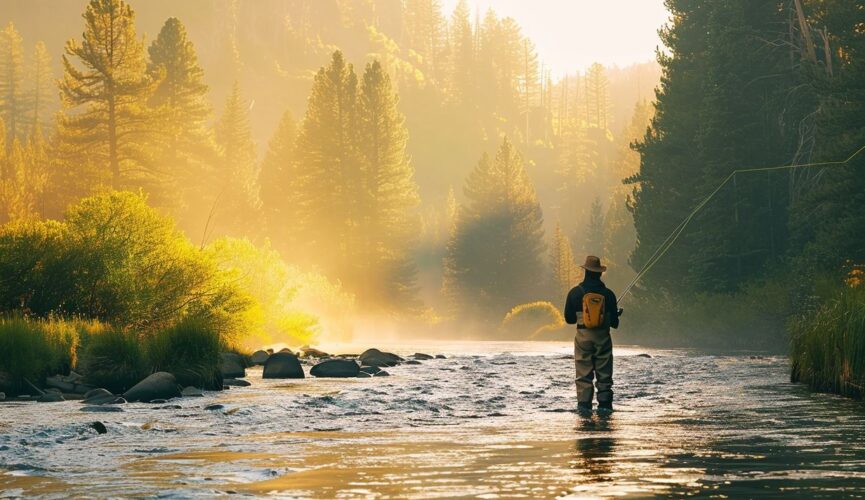Are you someone who’s really into fly fishing and thinking about diving into the world of being a fly fishing guide? Let’s take a closer look at what it takes to make it in this field. We’ll cover everything from the day-to-day responsibilities and essential skills to how you can carve out a successful path for yourself.
We’ll talk about the certifications and licenses you’ll need, and we’ll also dive into how you can get some valuable experience under your belt and connect with others in the fly fishing community. So, come along with us as we peel back the layers on what it’s like to be a fly fishing guide – the challenges, the perks, and everything in between.
What is Fly Fishing?
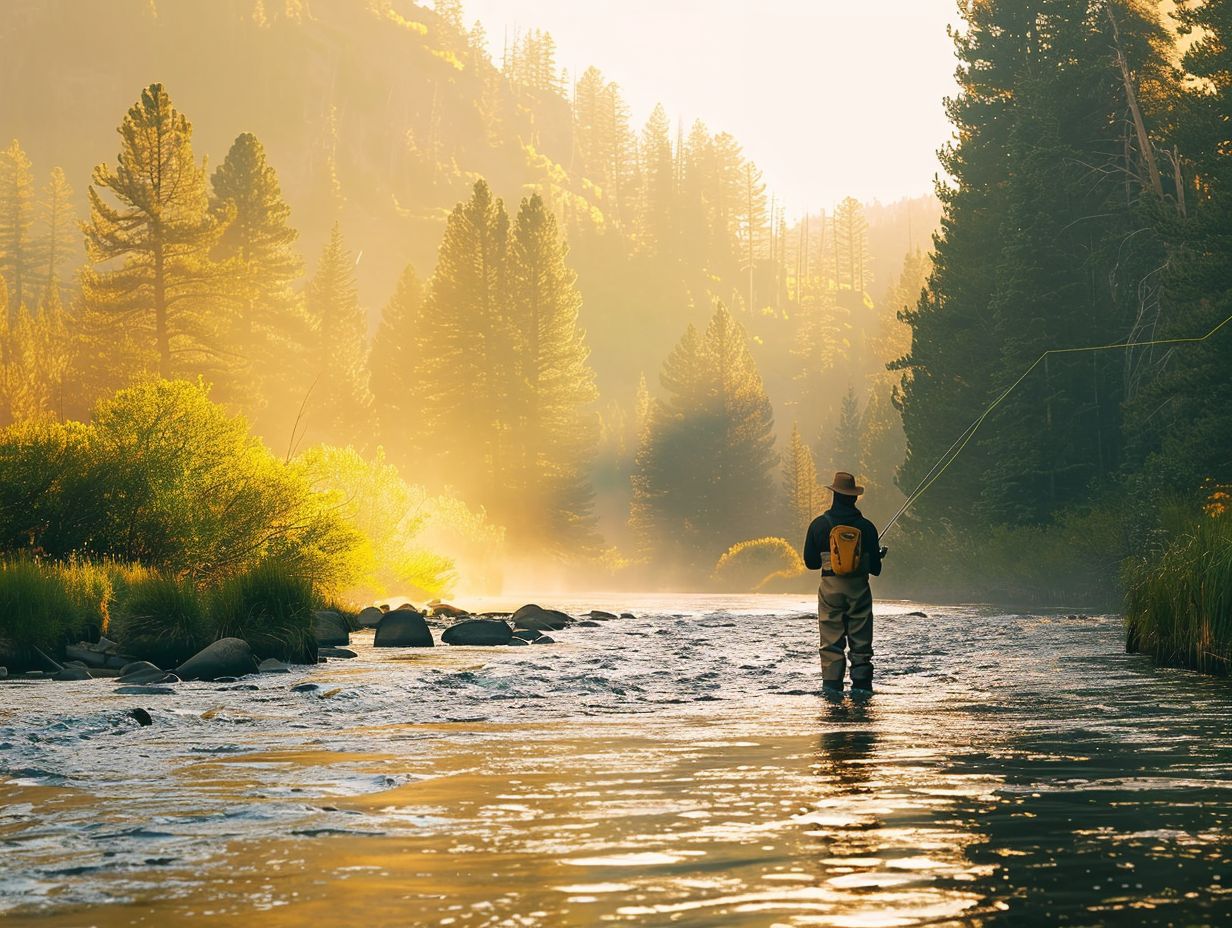
When you engage in fly fishing, you’re using a lightweight lure known as an artificial fly to hook fish in rivers, streams, and lakes. Unlike traditional bait fishing, fly fishing relies on casting techniques that imitate the movements of aquatic insects or other prey.
This peaceful activity of fly fishing in natural water bodies gives you a chance to connect with nature and appreciate the tranquil surroundings while you work on your skills. Casting flies to attract fish species requires precision and finesse, as you need to present the fly in a way that lures the fish into striking.
Using the right gear is essential in fly fishing, from choosing the appropriate fly rod and reel to selecting the right fly pattern. Different techniques, like dry fly fishing or nymphing, are used to make the artificial fly appear like a real insect, enticing fish to take the bait.
What is a Fly Fishing Guide?
You need a fly fishing guide when you want a pro to lead you on a fishing expedition, sharing their expert knowledge and skills to make your outdoor experience unforgettable. These guides are all about organizing fishing trips, giving lessons on casting techniques, and making sure everything’s safe and sound for your adventure.
Because they know the local waters and fish behavior like the back of their hand, they can lead you straight to the prime fishing spots, boosting your chances of reeling in a big catch. Fly fishing guides are also great at chatting with guests, customizing their guidance to match your skill level. And it’s not just about the fishing—these guides often throw in cool tidbits about the wildlife around you, making your outdoor adventure even more exciting with fun facts and observations.
What are the Responsibilities of a Fly Fishing Guide?
As a fly fishing guide, your main focus is on keeping your clients safe and sound during those guided fishing trips. You gotta show off your casting skills and expert knowledge on fly selection, while also preaching the good word on conservation efforts to protect those natural ecosystems you’re working in.
Make sure you’re a pro at communicating to your clients why catch-and-release practices are key for keeping fish populations healthy and thriving. It’s super important to be up-to-date on all the local rules and regulations to keep everything on the up and up and safeguard the environment. And don’t forget to brush up on your first aid skills and emergency protocols in case anything unexpected goes down during your fishing adventures.
By putting safety first and supporting those conservation movements, you’re a crucial player in preserving the beauty and integrity of the landscapes where you guide those fishing escapades.
What Skills and Qualifications are Needed to Become a Fly Fishing Guide?
To become a successful fly fishing guide, you need a mix of technical skills, people skills, and a real love for the sport. You’ve gotta be good at casting, know your fish behavior, have great communication with clients, and be able to handle all your fishing gear like a pro.
Getting certified is a big deal if you want to be a fly fishing guide. It shows you’re legit and serious about your work. Knowing your equipment inside and out is a must – you’ve got to be comfortable with rods, reels, lines, and flies.
Providing top-notch customer service is key. You’ve gotta make sure your clients have a blast and feel safe and happy throughout the experience. And don’t forget about mentorship – learning from experienced guides can really sharpen your skills and give you some valuable insights.
What Experience is Required?
To excel as a fly fishing guide, you need to gain hands-on experience in diverse water bodies like rivers, streams, and lakes. Understanding different fish species, honing your client communication skills, and mastering fly presentation are all crucial components in building a successful guiding career.
When you dive into various fishing environments, you’ll learn how to adapt to the unique challenges that different water bodies throw your way. This will teach you valuable navigation and safety skills, helping you become a well-rounded guide.
Encountering a range of fish species – from elusive trout to feisty bass – will deepen your knowledge and enhance your ability to effectively guide clients. Interacting with diverse anglers will also help you build essential interpersonal skills needed to tailor experiences for each client, ensuring they have a memorable and productive outing.
Perfecting the art of fly presentation and adjusting techniques to suit changing conditions will set you apart as a guide, allowing you to deliver successful fishing opportunities time and time again.
What Certifications or Licenses are Needed?
When you’re a fly fishing guide, it’s crucial to have the right certifications and licenses under your belt. Not only do these show that you’re following industry rules and know your stuff when it comes to wildlife conservation and the environment, but they also prove your dedication to responsible fishing practices.
By going after these certifications and licenses, you’re making sure you meet the standards set by the folks who regulate fishing. That means you’re doing your part to keep fishing sustainable and protect aquatic habitats. Plus, these credentials let everyone know that you’re all about preserving nature and getting other anglers on board with being good stewards of the environment.
Having those professional credentials says a lot about you as a guide. It shows that you’re committed to improving your skills, keeping up with the latest and greatest in fishing techniques, and making sure fly fishing sticks around for the long haul as a top-notch recreational activity.
What Other Skills are Beneficial?
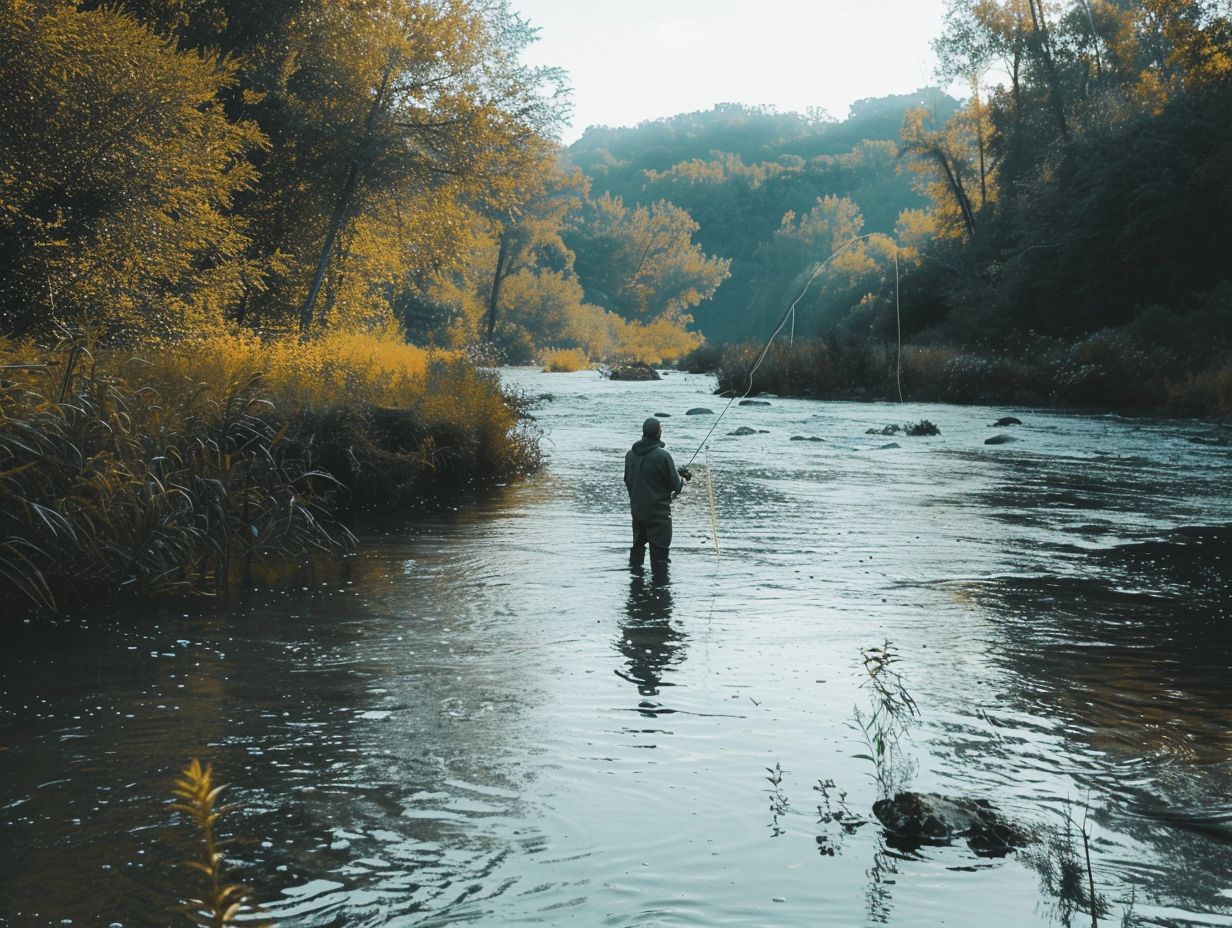
If you want to be a successful fly fishing guide, it’s not just about knowing your way around the water. You also need to have some serious business savvy, killer marketing skills, be involved in the angling community, and genuinely love being outdoors. These extra skills are what really set you up for success in the guiding world.
Being on top of your business game means you can handle the financial side of things like a pro – think budgeting for new gear or keeping track of client payments. And when it comes to marketing, having a solid strategy is key to attracting new clients, keeping your regulars happy, and standing out in a crowded industry.
Getting involved in the angling community is more than just making friends – it’s about staying in the loop with what’s happening, knowing the latest rules and trends, and finding new opportunities to connect. And last but not least, having a true passion for the great outdoors means you’ll not only be preserving nature but also sharing your love for fishing with others and giving back to your local environment.
How to Gain Experience as a Fly Fishing Guide?
If you want to gain valuable experience as a fly fishing guide, you should consider exploring diverse fishing spots, participating in guided excursions, engaging with the angling community, and actively networking with fellow guides and industry professionals. These hands-on opportunities pave the way for a successful guiding career.
When you visit various fishing spots, you get to understand different terrains, water bodies, and fish behaviors, which can enhance your adaptability and knowledge. Joining guided excursions exposes you to diverse fishing techniques and strategies, expanding your skill set. By connecting with the angling community, you have a platform to share experiences, gain insights, and stay updated on industry trends. Building a robust network within the fly fishing industry can open doors to collaborations, mentorship, and potential job opportunities, contributing to your growth as a fly fishing guide.
What are the Best Places to Gain Experience?
The best places for you to gain experience as a fly fishing guide are at renowned fishing spots in various rivers, lakes, and streams. Here, you’ll have the chance to come across different fish species and work on honing your outdoor recreation skills. It’s exploring these wilderness areas that will help you nail down navigation techniques vital for guiding trips.
These top-notch locations don’t just give you plenty of chances to get hands-on experience in fly fishing. They also create the perfect environment for you to observe and learn about the behavior of a wide array of fish species in their natural habitats. By fully immersing yourself in these diverse water bodies, you’ll not only boost your fishing skills but also cultivate a deeper understanding of aquatic ecosystems and the significance of conservation efforts.
How to Network and Make Connections in the Fly Fishing Industry?
Networking and forging connections within the fly fishing industry are crucial for aspiring guides like yourself. Engage with industry professionals, participate in the angling community, seek out mentorship opportunities, and think about enrolling in educational programs to broaden your knowledge base and establish valuable relationships that can push your guiding career forward.
When you actively engage with industry experts, you not only get insider knowledge but also show your dedication to the craft. Immersing yourself in the angling community lets you build connections with fellow enthusiasts and potential clients. Getting advice from experienced mentors can give you valuable insights and quick wins in the guiding business. Taking part in educational opportunities like workshops or certifications can enhance your skills and credibility, making you a more appealing resource for clients and industry collaborators.
How to Obtain the Necessary Certifications and Licenses?
To become a fly fishing guide, you need to get the right certifications and licenses. This involves completing training programs, studying up on the necessary materials, and getting a good grasp of environmental conservation practices. These certifications show that you know your stuff and are dedicated to sustainable angling practices.
When you take formal training courses for fly fishing guiding, you’ll learn all kinds of useful stuff like different techniques, safety rules, and regulations. Delving into materials on fish biology, stream ecology, and river mapping will help you understand the local ecosystems better and how crucial they are for fish populations. With environmental awareness baked into the certification process, guides can do their part in operating responsibly, reduce their impact on delicate habitats, and promote a conservation-minded ethos in the fly fishing world.
What are the Requirements for Each Certification or License?
When you’re looking to become a fly fishing guide, each certification or license you pursue will have its own set of requirements. These can cover everything from regulations and catch-and-release rules to boat handling skills and safety precautions. It’s essential that you understand and meet these prerequisites if you want to kickstart a successful guiding career.
By making sure you comply with regulations, you’re showing that you respect the laws and guidelines put in place to protect the environment and fish populations. Mastering catch-and-release techniques is key for conservation efforts and keeping the ecosystem in balance. Having solid skills in boat handling not only ensures safe navigation but also improves the overall experience for your clients. And don’t forget about following safety protocols – not only does this keep your clients safe, but it also shows your professionalism and dedication to providing a secure and enjoyable fishing trip.
Where to Find Training and Study Materials?
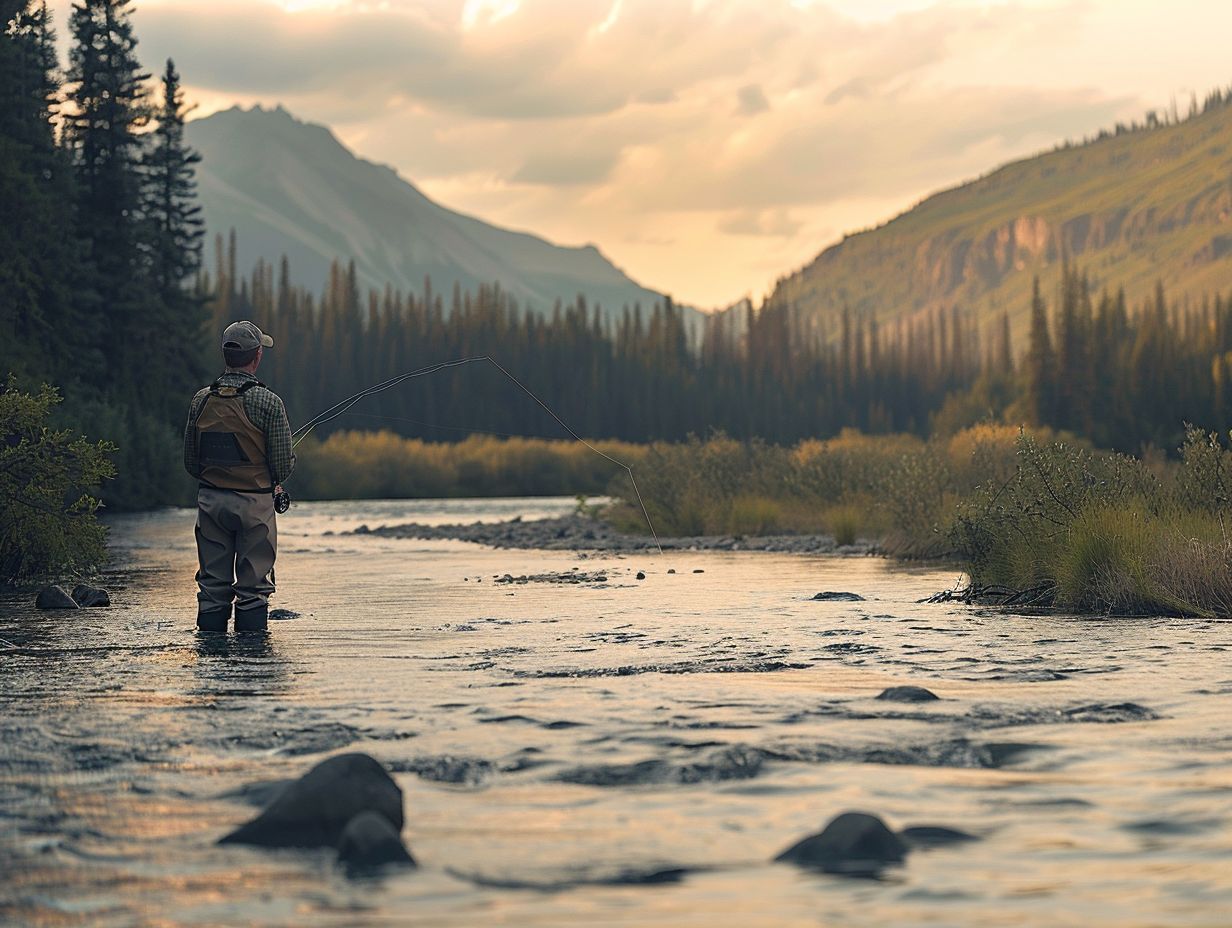
For aspiring fly fishing guides like you, there are some great ways to gain valuable training and study materials. You can check out educational programs, attend fly tying workshops, and dive into resources about aquatic insects and fish behavior. These are all awesome avenues for picking up practical knowledge and getting some hands-on experience to level up your guiding skills.
By joining workshops for fly tying, you’ll really sharpen your skills in making effective and personalized flies for all kinds of fishing scenarios. Digging into info about aquatic insects can help you understand the ecosystem better, which leads to smarter fly selection strategies. And don’t forget to look into resources about fish behavior – they’ll give you key insights into things like feeding habits, movement patterns, and where different fish like to hang out. This knowledge will help you predict and adapt to changing fishing conditions like a pro.
What are the Steps to Becoming a Successful Fly Fishing Guide?
As you embark on the journey to become a successful fly fishing guide, it’s all about building a strong reputation and client base. You need to keep improving your knowledge and skills, staying on top of regulations and safety rules, connecting with others in the industry, and always putting exceptional customer service first to create unforgettable experiences for your clients.
To really shine in this competitive field, you should focus on sharpening your casting techniques, mastering the art of fly tying, and diving deep into fish behavior. Keeping yourself updated on the latest equipment and technology trends can help you work more efficiently and effectively on the water.
Remember, following regulations is key to conserving resources and ensuring sustainability. Networking strategically can open up doors to valuable partnerships and opportunities. And always keep a customer-centric mindset by actively listening to your clients, anticipating their needs, and going that extra mile to exceed their expectations.
1. Build a Strong Reputation and Client Base
If you want to be a successful fly fishing guide, the first thing you gotta do is focus on building up a solid reputation in the angling community. It’s all about getting your name out there and growing your client base through smart marketing strategies. Having a good rep doesn’t just open up job opportunities, but it also helps you build trust and credibility with potential clients.
To reel in those customers, you gotta get strategic with your marketing. Put yourself out there on social media platforms where fishing folks hang out, and team up with outdoor gear stores for referrals. Show off your skills and provide top-notch service in fly fishing to get people talking about you. Word-of-mouth recommendations can really boost your reputation and keep clients coming back for more.
2. Continuously Improve and Expand Knowledge and Skills
If you want to dominate the world of fly fishing guiding, you’ve gotta keep learning and honing those skills. Sign up for educational programs, keep up with the latest fly fishing techniques, and get to know the newest fishing gear. This way, you can level up your guiding game and deliver top-notch service to your clients.
Get yourself into workshops, seminars, and specialized courses to fine-tune your knowledge and techniques. This will give you valuable insights into fish behavior and environmental factors. Mastering advanced casting methods like roll casting or double hauling can make a big difference in helping your clients nail those perfect casts and catch more fish.
Stay in the loop on the latest fishing gear trends, whether it’s new rod materials or cutting-edge fly designs. This way, you can recommend top-of-the-line equipment and take your clients’ fishing experience to a whole new level.
3. Stay Up-to-Date on Regulations and Safety Protocols
To be a successful fly fishing guide, you need to stay informed about industry regulations, follow safety measures, keep up with required licenses, and make sure you’re practicing environmental stewardship. Following these guidelines is crucial to being an ethical and sustainable guide.
Knowing the rules and regulations set by governing bodies isn’t just about professionalism – it’s about maintaining the integrity of the guiding industry. By staying updated on license requirements and safety protocols, you can ensure a safe and fulfilling experience for your clients while also contributing to the conservation of natural resources. Environmental ethics are key in preserving the ecosystems of fly fishing areas, underscoring the guides’ responsibility in safeguarding these environments for future generations.
4. Network and Collaborate with Other Guides and Industry Professionals
Networking and collaborating with fellow guides and industry professionals, engaging with the angling community, seeking mentorship opportunities, and fostering connections are key strategies to expand your job prospects and enhance your guiding career. Building a strong network opens doors to new opportunities and enriches your guiding experience.
By actively participating in industry events, workshops, and seminars, you can stay updated on the latest trends and techniques in fly fishing, which can significantly improve your skills and offerings as a guide. Connecting with other guides allows for knowledge sharing, collaboration on trips, and potentially referrals, which can boost your client base and reputation in the industry. Remember, networking isn’t just about exchanging business cards; it’s about building meaningful relationships that can support your growth and success as a fly fishing guide.
5. Provide Excellent Customer Service and Create Memorable Experiences for Clients
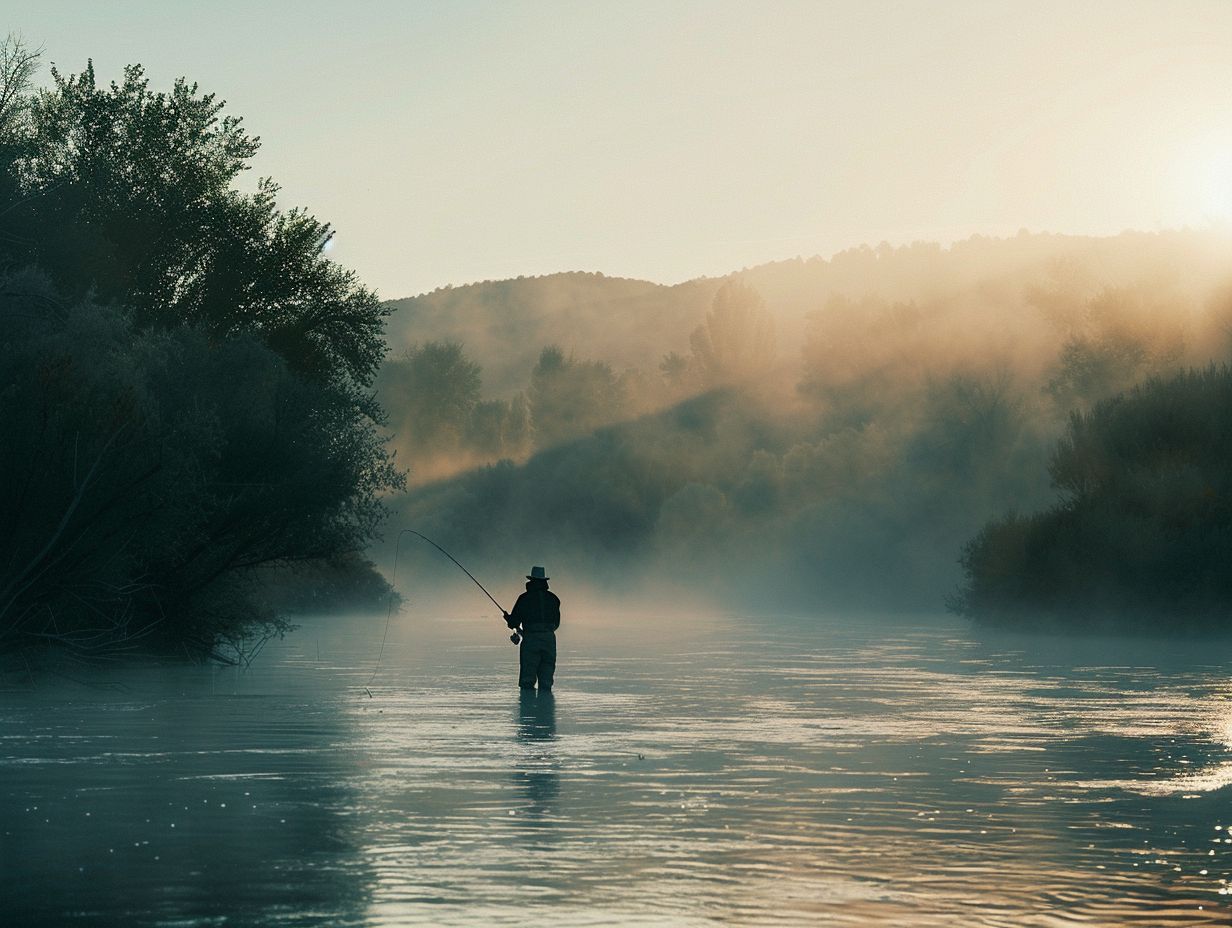
When you’re a fly fishing guide, giving top-notch customer service and creating unforgettable experiences for your clients is crucial. Your success hinges on how well you communicate with your clients, pay attention to details during trips, and genuinely love outdoor adventures.
To keep your clients happy and build lasting relationships, focus on customizing each guiding experience. By tailoring every trip to fit your clients’ unique preferences and skill levels, you not only make the experience better but also create memories that they’ll treasure forever. Your dedication to enhancing outdoor activities, whether it’s teaching advanced fishing techniques or showcasing the beauty of nature, adds extra value to your clients’ journey. Ultimately, your dedication to providing exceptional customer service is what will keep clients coming back for more and earn you a reputation as a trusted and in-demand guide.
What are the Challenges and Rewards of Being a Fly Fishing Guide?
As you step into the role of a fly fishing guide, you’re diving into a world that’s both challenging and rewarding, tailor-made for those who have a deep passion for the great outdoors and the art of angling. Sure, you’ll encounter hurdles like unpredictable weather and clients who are a handful, but the job also serves up a ton of satisfaction by crafting unforgettable experiences for your clients, championing environmental responsibility, and becoming a key player in the angling community.
Interacting with a diverse bunch of folks – from newbies eager to master the art of fly fishing to seasoned pros hungry for fresh adventures – brings a whole new exciting dimension to your gig. Guiding isn’t just about teaching skills; it’s also about spreading the word on conservation practices, making sure that the fragile ecosystems are treated with care and kept safe for the generations to come. And the bond you build with your clients doesn’t stop at the water’s edge; it blossoms into lasting friendships rooted in a shared love for nature and thrilling escapades.
Frequently Asked Questions
What qualifications are needed to become a fly fishing guide?
To become a fly fishing guide, you will need a valid fishing license, first aid and CPR certification, and knowledge of fly fishing techniques and equipment. Previous experience in customer service or guiding can also be beneficial.
Do I need to have my own fishing equipment to become a fly fishing guide?
While it is not required to have your own fishing equipment, it can be helpful to have a basic understanding of the different types of equipment and how to use them. Many training programs or guide services will provide equipment for you to use.
What kind of training is necessary to become a fly fishing guide?
There are several options for training to become a fly fishing guide, including guide schools, apprenticeships, and online courses. It is important to choose a reputable program that covers topics such as safety, local regulations, and customer service.
Are there any age restrictions for becoming a fly fishing guide?
The minimum age requirement to become a fly fishing guide varies depending on the location and company. Some may require you to be at least 18 years old, while others may allow younger individuals to guide with a parent or guardian present.
Is it necessary to have a specific skill level in fly fishing to become a guide?
While having a high skill level in fly fishing can be beneficial, it is not always necessary to become a guide. As long as you have a solid understanding of the fundamentals and are able to teach and assist others, you can still excel as a guide.
How can I find job opportunities as a fly fishing guide?
There are many ways to find job opportunities as a fly fishing guide, such as networking with other guides, applying to guide services or lodges, and attending trade shows or conferences. It is also helpful to have a strong online presence and marketing yourself to potential clients.

